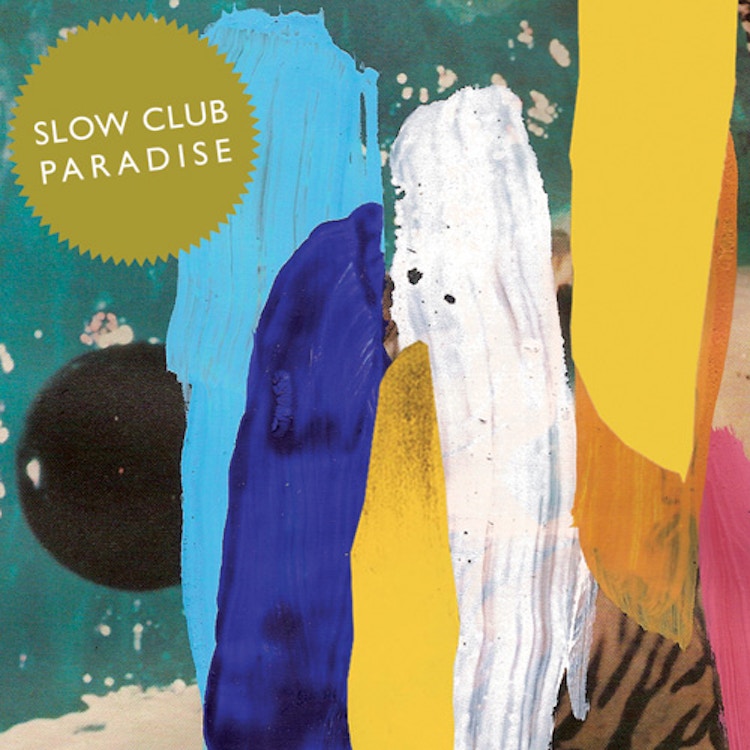"Paradise"

The documentary film The Promise sees young, dreamy Bruce Springsteen and his band twist through agonies and ecstasies creating Darkness on the Edge of Town. The band spends excruciating hours trying to perfect a snare hit for their pedantic Boss. Older Bruce reflects: “I fantasised these huge sounds. And so we went to pursue them, but they were always bigger in my head. We constantly were chasing something that was somewhat unattainable. What I didn’t understand was a fundamental equation: if you get big drums, the guitar sounds smaller. If you get big guitars, the drums are gonna have to… Something has to give. There’s only so much sonic range. But we didn’t know this at the time. We just assumed everything could sound huge.”
Hypothesis: If there is one pop band that can take a fair stab at this unattainable hugeness of sound, it is a a boy/girl duo from Sheffield called Slow Club. They’re a little way off the Thunder Road: they have a more English sense of whimsy, and stadium tours aren’t yet on the agenda. But Charles Watson and Rebecca Taylor can do huge. His guitar, her drums and their overlapping vocals seem to best each other constantly, like the inevitable end of any game of one potato, two potato: a happy mess of besting. Nearly any track from their debut, 2009’s Yeah So, works as an example of their compulsive need for crescendo – more cymbals, more barrelling guitar, more yelping “HEY, HEY / LOOK AT HIM GO!” till the very end. (Even after the end, there’s a secret track, which has a similar chord progression to Adele’s ‘Someone Like You’ but is better, because – didn’t I just tell you about the besting?)
And now we have the follow-up, Paradise. The first single, ‘Two Cousins’, immediately heralded change: the video is deliciously slick, with two male dancers lindy-hopping in ethereal black and white. You’ve guessed it, the new sound is yet bigger. The streetsy drums and stabs of piano are dead ringers for Matt & Kim, but the robust, ranging howl beyond them is undeniably Rebecca’s. It’s rarely easy to define the zeitgeist as you experience it, but somehow both ‘Never Look Back’ and rough-edged, dippy ballad ‘Beginners’ seem to capture a moment in music. They have adopted a popular formula, here: one part sultry doo-wop to one part fuzzy reverb. So elements of Best Coast, The Drums and Beach House abound, the common themes best evoked by those bands’ names themselves. There are even shades of Veckatimest-era Grizzly Bear, mostly in the newly crisp, metallic thunk and clatter of Charles’s electric guitar.
The only real drawback to Slow Club’s switch to a grander, more serious kind of pop is that their grander, more serious themes are mostly obscured. The band observes a lyrical shift towards the heavy stuff: the concept of family, fear of death, and deeper melancholies than previously mined. So the average listener might feel short-changed when they find most of this promised bounty buried, indecipherable beneath the echo and splash. Some pretty fragments drift past. Dreams gone to seed in ‘Hackney Marsh’ like a “cupboard full of bills” and a “sports car in three feet of grass”; the morbidity/vitality of the soil in ‘You, Earth or Ash’; in ‘Horses Jumping’ just the opening line “I forgot I used to swim” is somehow poignant enough. No song is so inscrutable as to make the album inaccessible, but it’s still disappointing, if only because sing-alongable lyrics have been such a focal point of the band’s previous work.
Bruce was right when he said that something always has to give. We have the said hugeness: Rebecca’s voice is reaching beloved-diva heights, and the instrumentation boasts violins, saxophones, and an array of pedals to give it all a seismic shiver. And we have the said sacrifices: details, a trademark intimacy. But when an album is bookended by such exuberant anthems as ‘Two Cousins’ and ‘Paradise’, why sweat the small stuff when the big stuff is the whole point?
Get the Best Fit take on the week in music direct to your inbox every Friday

Wet Leg
moisturizer

MF Tomlinson
Die To Wake Up From A Dream

BIG SPECIAL
National Average





